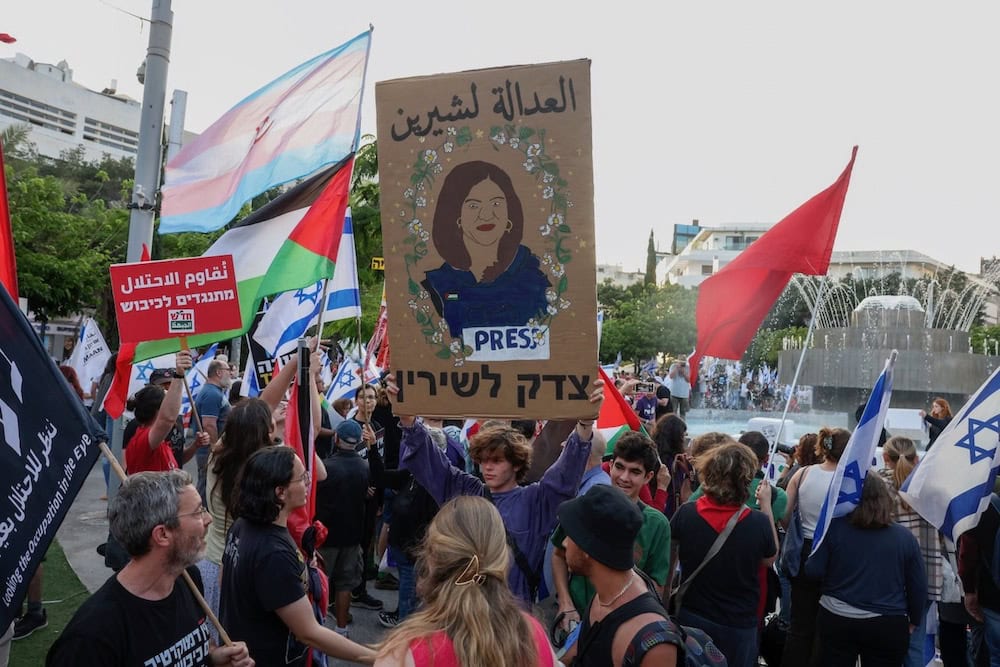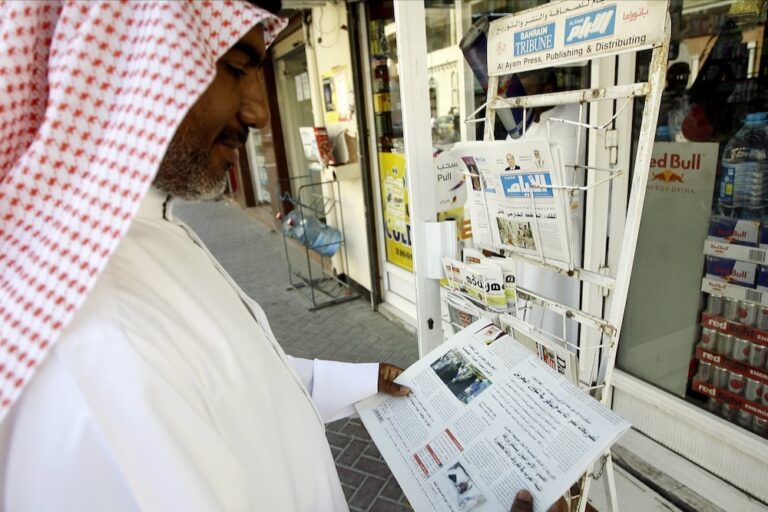May 2024 in MENA: A free expression round-up produced by IFEX’s Regional Editor Naseem Tarawnah, based on IFEX member reports and news from the region.
Concerns rise over Tunisia’s political climate as critics are arrested ahead of the presidential election. Israel targets Al Jazeera, detains Palestinian journalists amid persistent impunity. French court sentences three Syrian officials in landmark case.
Tunisia’s escalating crackdown erodes civic space
Ahead of the upcoming presidential election in Tunisia, concerns are mounting over an escalating crackdown on civil society and press freedom under President Kais Saeed’s government. This repression appears poised to intensify as Saeed seeks to consolidate his grip on power by targeting critics.
The crackdown began following a meeting between the Tunisian government and the Italian Ministry of Interior regarding migration management. On 3 May, authorities targeted 12 organisations aiding migrants and refugees, including those partnered with the UNHCR, on ambiguous charges such as “financial crimes”.
The arrests of members from NGOs like Mnemty, the Tunisian Refugee Council, and Terre d’Asile Tunisie illustrate the precarious situation for advocates of migrant and asylum seeker rights and the broader suppression of independent civil society in Tunisia.
“The clampdown on migration-related work at the same time as the increasing arrest of government critics and journalists sends a chilling message that anyone who doesn’t fall in line may end up in the authorities’ crosshairs.”
— Lama Fakih, MENA director at Human Rights Watch (HRW)
Security officers stormed the Tunisian Bar Association’s headquarters on 11 May during a live television broadcast, arresting and detaining lawyer and media personality Sonia Dahmani, and harassing a France 24 crew that was at the scene, including reporter Maryline Dumas and cameraman Hamdi Tlili.
🇹🇳 Police in #Tunisia have raided the bar association headquarters for the second time in two days and arrested another lawyer.
The new arrest after a day of strike action by legal professionals after police detained a lawyer critical of the president over the weekend ⤵️ pic.twitter.com/HmsPE6ugdo
— FRANCE 24 English (@France24_en) May 14, 2024
Dahmani was detained under Decree-law 54 on cybercrime for sarcastic comments about migrant claims by authorities. Her colleagues, reporters Borhen Bsaïes and Mourad Zeghidi were also arrested on the same day, over social posts, including criticism of the recent sentencing of radio journalist Mohamed Boughalleb to six months in prison under the same controversial decree. Two weeks following their arrest, a court sentenced Bsaïes and Zeghidi with two one-year prison sentences for disseminating “fake news” and “making false statements with the aim of defaming others”, in reference to the President.
Others caught in the crosshairs include Houssem Hajlaoui, a journalist and co-founder of the independent news website Inkyfada, who was arrested on 4 May for social media posts.
According to rights groups and activists, Tunisia’s 2022 cybercrime law has been regularly used to gag the media and violate free expression under the guise of combating online “fake news and rumours”, imposing heavy prison sentences.
While the arrests and sentences sparked protests among Tunisian journalists and civil society, who condemned the unprecedented threats and growing restrictions, the mounting repression undoubtedly marks a significant setback from the freedoms achieved following Tunisia’s 2011 revolution.
Despite calls for the repeal of repressive laws and the release of detained activists and journalists, the space for dissent is shrinking rapidly under Saeed’s government, raising concerns about the upcoming election’s political climate.
Israel’s media silencing and controlling the narrative
Last month, Israeli forces raided Al Jazeera’s office in occupied East Jerusalem, shutting down its broadcast, blocking its website, and accusing the channel of “supporting terrorism” and “threatening Israel’s national security.” This move, backed by a controversial new media law, marks a severe blow to access to information, particularly crucial amid Israel’s ongoing assault on Gaza.
The effort to silence Al Jazeera is part of a disturbing pattern of Israel targeting Palestinian journalists, particularly Al Jazeera’s correspondents, who have been key sources of on-the-ground information since the onset of Israel’s war in the Gaza strip.
According to the Palestinian Center for Development and Media Freedoms (MADA), at least 139 journalists have been killed since 7 October, including several Al Jazeera correspondents like Hamza Al-Dahdouh and photographer Samer Abu Daqqa, who were killed by Israeli forces in January while reporting on displaced civilians.
“Closing a major international broadcaster just days after World Press Freedom Day sends a stark and chilling message to all media in Israel.”
— IPI Executive Director Frane Maroević
MADA condemned Israel’s actions as a grave violation of media freedoms, urging international institutions to pressure Israeli authorities to reverse their decision and cease targeting media workers. Several IFEX members, including the Arab Center for the Advancement of Social Media (7amleh) and ARTICLE 19, echoed these sentiments, emphasising that efforts by Israeli authorities to: “control the war’s narrative through media restrictions violate international freedom of expression standards.”
In the same month, Israeli officials used the new media law to target the Associated Press (AP), briefly seizing equipment and disrupting live coverage from Gaza, accusing the news agency of providing images to Al Jazeera. The decision was reversed hours later following immediate pressure from US President Biden’s administration, highlighting a glaring double standard in international efforts regarding Israel’s silencing of media coverage.
Beyond Gaza, arbitrary administrative detentions have become another systemic feature of Israel’s suppression efforts. CPJ documented a total of 44 journalists arbitrarily arrested by Israeli authorities in the occupied Palestinian territories since 7 October, often without charge. At least 33 remain detained.
“Due process is failing, with lawyers and families often unable to find out why journalists have been arrested,” said the press group, which admitted the number of detained journalists may be higher as it has become increasingly difficult to verify information.
Growing concerns over the well-being of detainees like journalist Rula Hassanein, who was arbitrarily detained by Israeli authorities in March, highlight the grim reality faced by Palestinian media workers. Advocacy groups raised alarms over recent reports on the deteriorating health of the detained journalist and her infant daughter.
The target of an online incitement campaign, Hassanein’s case exemplifies the broader pattern of repression. An editor for the Ramallah-based Wattan Media Network, Hassanein was taken by Israeli forces who raided her home in Bethlehem on 19 March without explanation. Authorities handcuffed and blindfolded her, confiscated her laptop and cell phone, and transferred her to Damon Prison.
تحريض ضدي بالقتل والملاحقة عبر مجموعات للمستـ..ـوطنين
الله غالب ✌️ pic.twitter.com/6pRic3WY3R
— رولا حسنين (@rulahassaneen) October 10, 2023
[ TRANSLATION: “Incitement against me through threats of murder and persecution by groups of settlers.” ]
An Israeli court later charged her with incitement on social media and refused her lawyer’s request to release her as a humanitarian case to care for her nine-month-old daughter, whose health has suffered due to her absence.
Battling impunity, and the long wait for justice for Shireen
Despite Israel’s ongoing and escalating violations, the fight against impunity continues. On 24 May, the International Court of Justice (ICJ) issued provisional measures ordering Israel to cease its military offensive in Gaza’s Rafah and open border crossings for aid deliveries, following a plea from South Africa and amid accusations of Israel’s violations of the Genocide Convention.
Rights groups supported South Africa’s call to the ICJ to facilitate unimpeded media access to Gaza. They emphasized that Israel’s restrictions make it nearly impossible to document events on the ground comprehensively, risking future accountability efforts.
Reporters Without Borders (RSF) lodged a third complaint with the International Criminal Court (ICC) regarding Israeli war crimes against journalists in Gaza, urging accountability for Israel’s killing of journalists. The complaint asked the ICC prosecutor to investigate crimes against at least nine Palestinian reporters between 15 December and 20 May, in addition to over 100 journalists killed by Israeli forces since 7 October.
Even with documentation, achieving justice for Palestinian journalists killed in Gaza seems far off given the level of impunity Israel enjoys. The lack of progress in finding justice for the killing of Al Jazeera journalist Shireen Abu Akleh serves as a stark example of Israel’s persisting impunity. Last month marked two years since her death, and no one has been held accountable.
On May 11, 2022, Shireen Abu Akleh became the 44th journalist murdered by Israeli forces since 2000. Since then, Israeli forces have killed 142 journalists & media workers in Gaza. #SystemofSilencing @IMSforfreemedia @LinaAbuAkleh pic.twitter.com/bYQF7mssbH
— Visualizing Palestine (@visualizingpal) May 10, 2024
The Palestinian American journalist was killed by Israeli forces in 2022 while reporting on an Israeli military raid in the Jenin refugee camp. Months later, an Israeli army investigation admitted there was a “high probability” that Abu Akleh had been “accidentally hit” by Israeli fire, and declared it had no intention to hold the soldiers involved accountable. Israeli forces also attacked the journalist’s funeral proceedings.
Last month, CPJ called on the US Federal Bureau of Investigation (FBI) to provide a timeline for the conclusion of the 18-month investigation into her killing. Her family and Al Jazeera have also filed complaints with the ICC, seeking justice.
“Journalism is not a crime — but targeting journalists is,” said Lina Abu Akleh. “And the impunity that Israel enjoys has resulted in the killing and targeting of even more journalists in Gaza.”
In a gesture of solidarity, Palestinian journalists covering Gaza were recently recognised with this year’s IPI-IMS World Press Freedom Hero award, and the UNESCO/Guillermo Cano World Press Freedom Prize.
In solidarity with Palestinian journalists, media organisations, and our members in the Occupied Palestinian Territory (OPT), IFEX stands firm in its call to end Israel’s impunity and demands accountability for its crimes against journalists and civil society. Read our full statement.
In Brief
Last month, French courts convicted three senior Syrian officials, including Ali Mamlouk, Jamil Hassan, and Abdel Salam Mahmoud, in absentia for crimes against humanity and war crimes. Their charges stem from their role in the imprisonment, enforced disappearance, and torture of dual Syrian-French citizens, Patrick and Mazzen Dabbagh, in 2013.
Despite some closure for the plaintiffs, the absence of an extradition treaty between France and Syria renders the outcome largely symbolic. Nonetheless, the trial represents a landmark case against the Assad regime, helping further expose the regime’s many atrocities.
In Egypt, opposition figure Ahmed Tantawy was arrested during a Cairo court session, confirmed by his lawyer Nabeh El-Ganadi. Once a significant challenger to President Sisi, Tantawy appealed a February ruling sentencing him to one year in prison and banning him from future national elections for five years for unauthorised presidential campaign endorsements. Accused alongside his campaign manager Mohamed Aboul Diyar, Tantawy faced charges of circulating election-related papers without official authorisation. He withdrew from the race in October, citing intimidation and a crackdown.
Finally, last month’s conference, Bread&Net,brought together participants online to tackle pressing digital rights issues facing the region. Discussions covered unconventional reporting in conflict zones, censorship on social media, and heightened state surveillance, shedding light on threats to freedom of expression and safety for journalists and activists.



